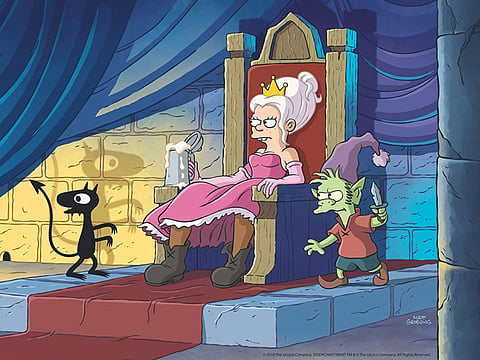‘Disenchantment’ review: A patchy start
The new Netflix series by the creator of ‘The Simpsons’, tries to pack too much and too many characters in the beginning

The big thing to remember about Matt Groening projects is that they always take time to warm up. Futurama began life as a dystopian sci-fi about the prominent use of streetside suicide booths, but eventually became lovely enough to accommodate the sweetly heartfelt episode The Devil’s Hands Are Idle Playthings. The Simpsons will forever be the show of Do It For Her, despite originally being a deliberately iconoclastic satire about an alcoholic child-strangler.
So, the good news is that Groening’s new animated Netflix series, Disenchantment, may grow into itself before long. The bad news is that it isn’t there yet.
Apparently originally envisioned as a sequel to The Simpsons Movie — in which Homer would play the king of a Tolkienesque fantasy world; thank God that wasn’t greenlit — Disenchantment is a sprawling saga in the style of Game of Thrones about a rebellious princess determined to buck the ossified traditions of her family. She moves through the land, butting heads with her oafish dad and arrogant would-be suitor, with only an elf and a demon for company. And, well, that’s about it.
The first thing you are likely to notice about Disenchantment is that it is much more Futurama than The Simpsons. The latter grew slowly outwards from a nuclear-family kernel over the space of several years, but, like Futurama before it, Disenchantment lands fully formed. Within the first 15 minutes, we are assaulted with more characters, species, worlds and dimensions than we can deal with. If the show had had the guts to parcel things out slowly — which it should have done, because you can smash through all 10 episodes in an afternoon — then we might have ended up caring about the characters a little more. But, at least at first, they feel a little thin.
The pilot feels as if it has been stretched out for the sake of it — as a result, acres of dead air surround each joke
This is despite the sometimes punishing running time. Until now, Groening’s creations have been gorgeously dense, with jokes and puns and sight gags piling up on jokes at crackerjack pace. But here, freed of the constraints of scheduled television, things are more relaxed. Most of the episodes hover around the 27-minute mark — five minutes longer than The Simpsons — but the first episode is 35 minutes long, and needlessly so. The pilot feels as if it has been stretched out for the sake of it — as a result, acres of dead air surround each joke.
Another quibble is that, while Disenchantment has amassed a murderers’ row of voice talent, it hasn’t quite worked out what to do with any of them yet. Abbi Jacobson, Eric Andre and Matt Berry all have specific anarchic streaks, yet here they all seem slightly constrained by a script that hasn’t been tailored to their skill sets. Only John DiMaggio lands with any sense of zeal, perhaps because his King Zog is exactly as boorish as Bender before him.
I am sure these kinks will be ironed out in time. Go back and watch the first episode of The Simpsons. Look how stilted and jerky it was before it discovered how to fire on all its cylinders. Look how aggressively it tried to make Bart the main character. Listen to Dan Castellaneta imitate Walter Matthau as he fumbled around to find Homer’s true voice. Within a couple of years, it became a gleaming jet engine of a thing, but initially it was a work in progress.
The same will almost definitely be true of Disenchantment. The first run of episodes is fine, but let’s treat them as a pipe-clearing exercise. Soon enough, the writers will start writing for the performers, the characters will start to pop, the show will lose its compulsion to push buttons for the sake of it (the opening 15 minutes alone feature fistfights, stabbing, heavy petting, hanging and two separate peeping Tom incidents) and it will settle into something special. There is promise in Disenchantment, but we will have to wait for it to be realised.
Don’t miss it!
Disenchantment streams on Netflix from August 17.


